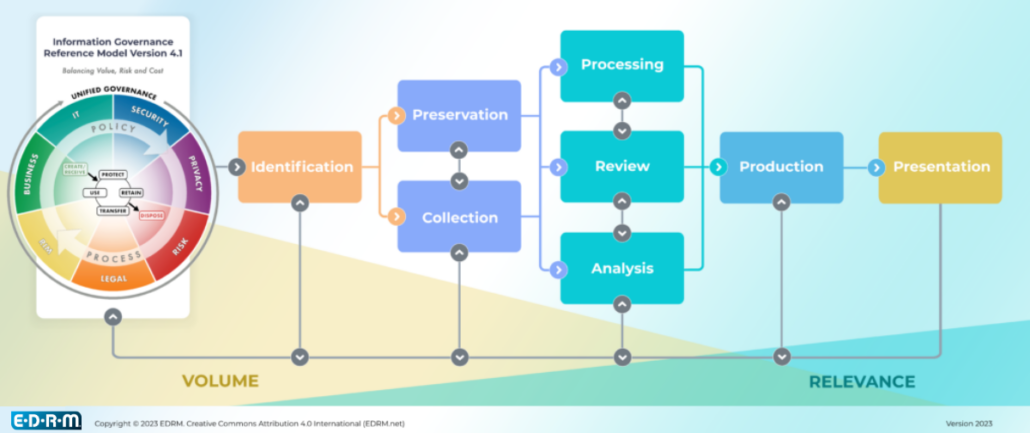When navigating the sea of data and terms of art in eDiscovery, it can feel a bit like you are wading through murky alphabet soup. Seriously, this industry sometimes feels a bit like it has gone overboard on the Acronyms! EDRM, OCR, TAR, GDPR… the list of eDiscovery term acronyms goes on… and on!
Fear not my legal eagles, this cheeky blog can serve as your cliff notes for the eDiscovery term acronyms you have come across and been too afraid to ask about!

- ACEDS (Association of Certified E-Discovery Specialists): The cool club for eDiscovery pros, where getting certified means you’re serious about mastering the art and science of eDiscovery – think of it as getting your black belt in digital data wrangling! Yours truly has had my CEDS (Certified eDiscovery Specialist) designation for almost a decade!
- AI (Artificial Intelligence): The brainy tech that’s transforming eDiscovery and the world, using algorithms to mimic human intelligence and make sense of complex legal data.
- ALSP (Alternative Legal Service Provider): The innovative disruptors in the legal world, offering alternative ways to handle legal tasks, including eDiscovery, and shaking up the traditional legal landscape.
- BYOD (Bring Your Own Device): The workplace trend where employees bring their personal devices to work, adding a layer of complexity to eDiscovery as data travels across different devices. Collecting and preserving electronic files from custodians with a BYOD policy can be quite the headache!

- CCPA (California Consumer Privacy Act): California’s own heavyweight in the data privacy ring, giving folks more control over their personal information and keeping eDiscovery professionals on their toes.
- CLOC (Corporate Legal Operations Consortium): A group of super-smart folks focused on optimizing legal operations, driving efficiency, and revolutionizing legal processes.
- CSV (Comma-Separated Values): The unsung hero of data formats, making it easy to transfer large amounts of data into and out of eDiscovery systems – think of it as the universal translator for data.
- DMS (Document Management System): Your digital filing cabinet, where documents are stored, organized, and retrieved – it’s the Marie Kondo of legal data. Does it hash value joy?!
- DNS (Domain Name System): The address book of the internet, a potential source of evidence in eDiscovery when tracing online activities.
- ECA (Early Case Assessment): This is where you play detective early on in a case, using tech to get a quick lay of the land of your data landscape, crucial for strategy and cost management in eDiscovery.
- EDA (Electronic Data Assessment): The eDiscovery crystal ball that helps you peek into your data universe before diving in, allowing you to plan your strategy and resources effectively.

- EDRM (Electronic Discovery Reference Model): The roadmap of eDiscovery, guiding you from information governance to presentation in court – think of it as your eDiscovery GPS. it is also an association with a wealth of resources for eDiscovery professionals about the eDiscovery process and workflows.
- ESI (Electronically Stored Information): The data goldmine of the digital age, encompassing all those emails, documents, and texts that weave the story of a case in the eDiscovery world.
- FOIA (Freedom of Information Act): A key player in public records requests, making government information accessible and sometimes a goldmine in eDiscovery.
- FRCP (Federal Rules of Civil Procedure): The rulebook governing civil litigation in the U.S. courts, laying down the law for eDiscovery practices.

- GAI (Generative AI): AI’s smarty pants cousin who can do more than think like a human, it can create things written and visual that replicate human creativity.
- GDPR (General Data Protection Regulation): Europe’s tough cookie of data privacy laws that has everyone in eDiscovery and beyond sitting up and paying attention. When it comes to European PII GDPR is in the driver’s seat.
- FCPA (Foreign Corrupt Practices Act): The global sheriff against bribery and corruption, often playing a starring role in eDiscovery for multinational corporations.
- HIPAA (Health Insurance Portability and Accountability Act): The guard dog of health information privacy, crucial for eDiscovery pros handling sensitive medical data, PHI.
- ILTA (International Legal Technology Association): The cool kids’ club for legal tech pros, where ideas, trends, and best practices in legal technology, including eDiscovery, are shared and shaped.

- IoT (Internet of Things): Where everyday devices like your fridge or car go online, generating a goldmine of data (and headaches) for eDiscovery pros. The IoT metadata can complicate a discovery request or be the smoking gun.
- ISO (International Organization for Standardization): These are the folks setting the global standards, including for information security in eDiscovery – think of them as the rule-makers for playing it safe.
- JPEG (Joint Photographic Experts Group): The unsung hero of image formats, preserving the beauty of digital photos while keeping file sizes manageable, a true artist in the world of eDiscovery visuals.
- LPO (Legal Process Outsourcing): The art of delegating legal work, often including eDiscovery tasks, to external specialists – because sometimes, it takes a village!
- LSP (Legal Service Provider): A Technology or document review partner who extends your organization’s capabilities and serves as a force multiplier.

- ML (Machine Learning): AI’s clever cousin, where computers learn from data to find patterns and make decisions, making eDiscovery smarter by the minute.
- NIST (National Institute of Standards and Technology): They’re the wizards behind the curtain, developing standards and guidelines, including for cybersecurity in eDiscovery. Sometimes you see this acronym in the processing phase of the EDRM for eDiscovery workflows as it related to deNISTING or removing certain file types.
- OCR (Optical Character Recognition): The magic wand that turns scanned documents into searchable text, so you don’t have to squint at every page. Magically turns 1s and Zero’s into something a review platform can enable a legal team to review and analyze.
- PACER (Public Access to Court Electronic Records): The treasure trove of federal court documents, often a go-to source in eDiscovery for digging up case histories and court filings.

- PHI (Protected Health Information): Think of it as HIPAA’s BFF – any information in a medical record that can be used to identify an individual, and its gold (and dynamite!) in healthcare-related eDiscovery.
- PII (Personally Identifiable Information): The hot potatoes of data that eDiscovery professionals handle with care – we’re talking social security numbers, addresses, and more.
- PST (Personal Storage Table): Microsoft Outlook’s way of storing your emails and calendar items, often a treasure trove in eDiscovery cases.
- TAR (Technology-Assisted Review): A time-saving hero in eDiscovery, using algorithms to quickly sort through piles of documents, like finding a needle in a digital haystack.
- SaaS (Software as a Service): The cloud-based software delivery model that’s changing the game in eDiscovery, offering tools and applications via the internet.
- SOC (System and Organization Controls): The guidelines for assessing the security and privacy controls of service organizations, a critical aspect of eDiscovery when third-party data is involved.
- SQL (Structured Query Language): The secret language for talking to databases, super handy for searching and retrieving data in eDiscovery systems.
- TIFF (Tagged Image File Format): The reliable workhorse of image formats, preserving every pixel and detail, making it a go-to choice for high-quality document imaging in eDiscovery.

- UI/UX (User Interface/User Experience): How easy and pleasant your eDiscovery software is to use – because nobody likes wrestling with clunky tech.
- VPN (Virtual Private Network): The digital invisibility cloak for your internet connection, keeping data secure and private, a must in the eDiscovery world.
- 2FA (Two-Factor Authentication): The double lock on the digital vault, enhancing security and potentially creating valuable audit trails in eDiscovery.
Hopefully, this makes the game of eDiscovery terms acronym roulette a little less daunting!


